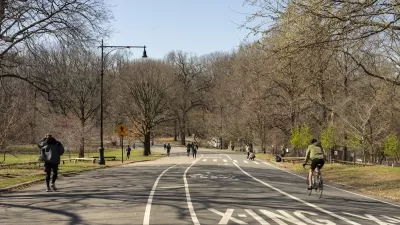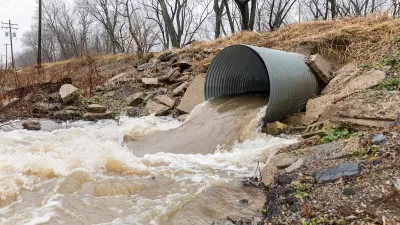Creating adaptive, sustainable communities may require rethinking some planning basics.

Stephanie Sklar, CEO of the Sonoran Institute, and George McCarthy, CEO of the Lincoln Institute of Land Policy, call for a paradigm shift in the planning field to better prepare for the impacts of climate change, grounding their argument in the context of Colorado’s state water goals. By 2025, Colorado aims for water conservation to be integrated land-use planning in communities accounting for 75 percent of the state.
"Local planners are at the forefront in addressing Colorado's water future," Sklar and McCarthy write, because the state’s water plan "recognizes the impact that land use has on water resources."
But to fulfill that goal—and build sustainable communities nationwide—planning as usual may not cut it.
The impacts of climate change could unfold into "a range of unpredictable futures," from drought to global economic loss. To prepare, planners may need to embrace the seeming antithesis of planning: uncertainty. "'What if…' should be a planner's mantra going forward," the authors suggest.
To illustrate how that philosophical shift could change the practice:
Water and wastewater infrastructure investments typically extend over a 30-year lifespan but often reflect key assumptions made at a project's initial conception. Will those assumptions hold over three decades, particularly as they relate to infrastructure payment and usage, in a more uncertain future?
Moreover, though Colorado's water plan is centered on community planning, municipalities need to adopt more cross-jurisdictional collaboration—particularly within a shared watershed.
"Planning for our future must occur at the scale of the problems we are trying to solve," the writers urge.
FULL STORY: Viewpoint: New approaches needed to meet Colorado's future water demands

Planetizen Federal Action Tracker
A weekly monitor of how Trump’s orders and actions are impacting planners and planning in America.

Restaurant Patios Were a Pandemic Win — Why Were They so Hard to Keep?
Social distancing requirements and changes in travel patterns prompted cities to pilot new uses for street and sidewalk space. Then it got complicated.

Map: Where Senate Republicans Want to Sell Your Public Lands
For public land advocates, the Senate Republicans’ proposal to sell millions of acres of public land in the West is “the biggest fight of their careers.”

Orange County, Florida Adopts Largest US “Sprawl Repair” Code
The ‘Orange Code’ seeks to rectify decades of sprawl-inducing, car-oriented development.

Maui's Vacation Rental Debate Turns Ugly
Verbal attacks, misinformation campaigns and fistfights plague a high-stakes debate to convert thousands of vacation rentals into long-term housing.

San Francisco Suspends Traffic Calming Amidst Record Deaths
Citing “a challenging fiscal landscape,” the city will cease the program on the heels of 42 traffic deaths, including 24 pedestrians.
Urban Design for Planners 1: Software Tools
This six-course series explores essential urban design concepts using open source software and equips planners with the tools they need to participate fully in the urban design process.
Planning for Universal Design
Learn the tools for implementing Universal Design in planning regulations.
Heyer Gruel & Associates PA
JM Goldson LLC
Custer County Colorado
City of Camden Redevelopment Agency
City of Astoria
Transportation Research & Education Center (TREC) at Portland State University
Camden Redevelopment Agency
City of Claremont
Municipality of Princeton (NJ)





























